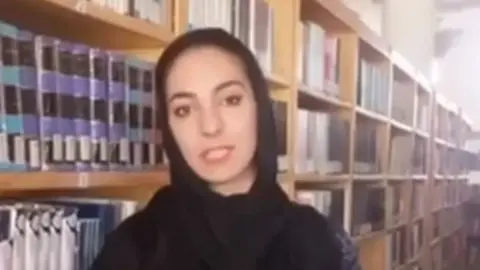Why Afghan women are campaigning for their names to be heard
In Afghan society it is the custom that women's names should not be uttered publicly.
Women are generally only referred to as the mother, daughter or sister of the eldest male in their family. Using the name of a woman is frowned upon and can even be considered an insult.
According to a report by Thomson-Reuters, Afghan law dictates that a mother's name should not be recorded on a birth certificate.
But Afghan women's rights activists are seeking change by using social media with a campaign called #WhereIsMyName
#WhereIsMyName has been used over 1,000 times in the last few days.
Allow X content?
Bahar Sohaili, who is involved in the movement told the New York Times: "This is just a spark — the posing of a question mostly to the Afghan women about why their identity is denied. The reality is that women also remain silent — they don't protest this."
Najla from Kabul, who is a supporter of the campaign told the BBC:
"We have inherited this superstitious tradition from older generations. Even the men, who feel embarrassed to mention the name of their wives, do not know the reason. They only think it is the way because they have heard so from elders."
You might like:
The popular Afghani musician Farhad Darya got behind the campaign on 10 July sharing a photo of himself and his wife Sultana. He mentions in the post how he has received negative reactions from crowds at gigs whenever he says the name of his wife or mother. But the comments under his post were overwhelmingly positive:
"I am so happy to see our singers also standing in support of our womens' rights". Khanom Leila wrote.
It even inspired other male users to follow suit: "Now, call me a coward too; my wife's name is Tahira," Nazir Said wrote.
"Hiding women's name has nothing to do with Islam. Had it been the case, why everyone knows the names of Islam's prophet's wives?" Nashir Ansari commented.
Nameless graves
BBC Persian spoke to various Afghani women championing the campaign:
"I am a woman and a human being before being someone's mother, someone's sister, someone's daughter or someone's wife," Tahmina from Kabul told the BBC: "I want to be called by my own name. I am tired of being called by someone else's name outside, in school, at home, in the market and everywhere. It is really painful for me."
 BBC Persian
BBC PersianTalaya from Herat agreed saying: "Because a woman's identity is not even mentioned in their funeral, not written on their funeral cards and doesn't appear on their tombstones, they remain unidentified even after death.
"In this fight, not only women but men who also should stand beside the suffering women of our country and make efforts for regaining their lost rights. They have to try day and night."
 BBC Persian
BBC PersianBy UGC & Social News team, additional reporting by BBC Monitoring
